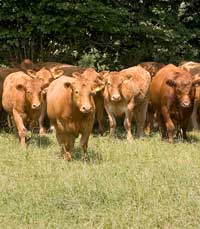Dairy Event 2010: Weigh scales are a must

Ensuring beef cattle are hitting their target daily weight gain in the final finishing period can only be achieved by regular monitoring of their liveweight.
That’s the theory constantly expounded by the pundits, but in practice most beef producers do not weigh their finishing cattle and many do not even own a set of weigh scales.
Essex beef consultant David Hendy says feed conversion efficiency of beef cattle in the final finishing period is critical to daily weight gain and ultimately to bottom-line profits.
“How much food is required to achieve 1kg of weight gain is an essential part of being able to assess the performance of cattle and influence how much margin they’ll leave.”
Feed conversion efficiency is often not good in store cattle and as these animals reach the 15-month stage it gets even worse – a situation that means it takes more feed to achieve a satisfactory weight gain.
“But only by weighing cattle regularly can finishers maintain a true picture of how their cattle are actually performing and how well the diet is achieving the growth rates required,” says Mr Hendy.
And while there may be various reasons why cattle aren’t performing as well as they should, diet usually has a significant part to play.
“In an ideal world, beef finishers should weigh cattle once a month to monitor performance. Cattle should be weighed when they arrive on farm and again two months later. It takes cattle that length of time to adjust and settle to a new regime.” And when the second weight suggests the diet needs adjusting, producers should be aware that changes must be made slowly.
